Editor:
Brandon Sweet
University Communications
bulletin@uwaterloo.ca
Excellent teachers and researchers celebrated today
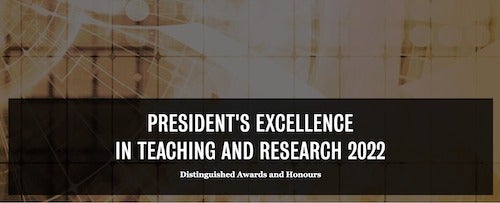
Congratulations are in order to those members of the University who are honoured as part of the President’s Excellence in Teaching and Research celebration. University of Waterloo professors, graduate students and postdoctoral fellows who earned awards for either excellence in teaching or distinction in research are being honoured.
The University of Waterloo is celebrating 189 University community members who have won teaching and research-related awards. 134 researchers at the University won research awards in the previous year, with 40 instructors receiving teaching awards and 15 people recognized for service and other achievements.
You can read the full roster of award winners on the President's Excellence in Teaching and Research website.
The next big computing evolution

By Rose Simone. This article was originally published on the Global Impact Report website.
Computing evolutions of the past few decades have already taken us from floppy discs to an era of almost instantaneous communication in an internet-connected world.
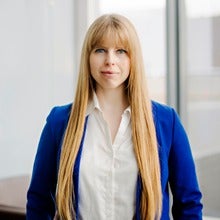
But quantum computers promise “an even bigger transformation,” says Christine Muschik, a physics and astronomy professor and member of the University of Waterloo’s Institute for Quantum Computing.
“You could simulate, for instance, new materials,” Muschik says. “You could develop better fertilizers. You could come up with new ways to remove carbon dioxide from the atmosphere. You could design new drugs.”
These are examples of what she calls “interesting problems” that quantum computers could be used for.
The quantum superpower found in nature
Even the present-day supercomputers have their limits. They process information in the form of zeros or ones, one line at a time. This means that no matter how big or how powerful they are, some simulations are so complex they can’t be done with classical computers.
But nature has an amazing computing superpower. It is called superposition, whereby information can be grasped in more than one state at the same time. (For example, the spin of a particle can be up and down at the same time.) “The classical computer runs out of steam and out of memory in keeping track of all the combinations, but nature does it effortlessly,” Muschik says.
Being able to build computers to harness this quantum superpower is a long-standing dream of physicists. Even 40 years ago, long before quantum computers were a possibility, the famous physicist Richard Feynman said “nature isn't classical … if you want to make a simulation of nature, you'd better make it quantum mechanical.”
That’s what Muschik is working on. She wants quantum computers that can solve interesting problems, such as simulating quantum interactions, biochemical interactions, processes inside a neutron star or the early moments of the universe.
New methods of scientific computing
The technology is getting there. In 2019, Google scientists announced they had achieved “quantum supremacy” by solving a problem on a quantum computer that a classical computer could not solve. But it was a very narrow, specific problem. Getting a quantum computer to do something more complex is difficult.
Muschik explains that in regular computers, there is a lot of error correction going on, as the bits of ones and zeros are being processed using the gates on a computer chip. In a quantum computer, correcting errors is possible in principle, but still technically challenging. The experimental quantum computers that exist today are not error-corrected and mistakes get through. “If I have too many quantum gates in my quantum circuit, then so much error accumulates that we see only noise in the computation,” she says.
To solve this problem, Muschik is thinking outside the box. She is reimagining what computing itself could look like. “We are coming up with new methods for scientific computing,” she says.
Muschik is internationally recognized for her creative research. She received a 2019 Alfred P. Sloan Research Fellow in Physics, given to early-career scientists of outstanding promise. She is still one of few women in the field, although she says women are getting much more support now.
Combining classical and quantum computing
Muschik’s group has achieved some remarkable successes. Most recently, they performed the first-ever simulation of baryons — the particles that make up the matter that surrounds us — on a quantum computer.
To achieve this, the group used hybrid computing whereby a classical and a quantum computer are tied together in a kind of feedback loop. The classical computer can be tasked with parts of a problem that it can do easily, and then the quantum computer can take over to do the parts that are too complicated. They pass the problem back and forth to solve it in a resource-efficient way.
“Instead of replacing the existing infrastructure, we can integrate the quantum computer into the existing infrastructure and complement it,” Muschik says.
Continuing quantum computing research
Muschik’s group has also been working on a completely new method to get around the extremely error-prone quantum gates in hybrid computing. When particles are entangled, the state (such as the spin value) of one particle in the pair can change instantly when a measurement is made on the other particle. Her group has shown that it is possible to do hybrid computing as a series of measurements on these quantum states and then use measurements to do the calculation, without the need for quantum gates.
“The algorithms to do this look really strange because it's a completely different computing concept, but we have shown that it works,” Muschik says. Next, she hopes to team up with an experimental group to further develop this new measurement approach.
“What is very interesting about this field is that there are is so much unexplored territory. There is a lot of room for true innovation and space for new ideas,” she says.
Chief Information Officer to delay retirement until 2023
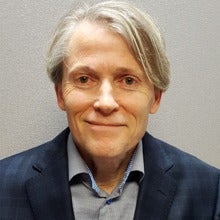
Chief Information Officer Bruce Campbell will be staying at the University of Waterloo a little while longer.
"As you know CIO Bruce Campbell's retirement plans for this August were announced last fall," wrote Vice-President, Academic & Provost Jim Rush in a memo circulated to Information Systems & Technology (IST) staff members earlier this week. "As announced in the Daily Bulletin on April 11, the University is making a senior leadership organizational change, such that the units of Information Systems and Technology, and Human Resources, will report to the new Vice President Finance and Administration (VPFA), once hired."
"The recruitment of Bruce’s successor will be the responsibility of the new VPFA," the provost writes. "Bruce has agreed to stay on as CIO until early 2023, to allow time for the recruitment of the new CIO. This is preferable to the alternative of a fairly long interim CIO appointment, and it will also provide an overlap period where Bruce works with the new VPFA."
"Bruce will be taking some vacation time this summer and will appoint acting CIOs from among the IST Directors in the usual manner," the provost writes. "Thank you to Bruce for flexibility in his retirement plans."
The recruitment of the new VPFA is expected to conclude this fall.
University Health Network hires dozens of co-op students for launch of new health information system

By Ryan Kehoe. This is an excerpt of an article originally published on the Co-operative and Experiential Education website.
You have six months to complete and implement a brand-new health information system at the largest research hospital in Canada. What do you do? Hire a talented group of co-op students to help.
University of Waterloo co-op students are fast learners and can multi-task and shift priorities quickly. These skills were just what the University Health Network (UHN) needed to help implement their new health information system from Epic, with a project called Synapse. The hospital hired 114 UWaterloo co-op students for this transformational project.
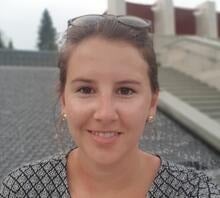
Chelsea King (BSC’17) is the change management lead for the project at UHN. "It's more than just a job,” she says. “It's really an opportunity to contribute and give back in a way that will impact society."
King believes the healthcare sector is a thriving industry where co-op students can provide value for their employers.
"Working in healthcare is really a privilege,” says King. “Students have that opportunity to see it firsthand, to participate, and to help drive forward change. Change that will benefit patients for generations to come. It really is an amazing experience."
Co-op experience carries over to new digital projects
During her own co-op experience, King worked on a very similar project called Dovetale at St. Joseph's Healthcare Hamilton. After graduating, she was hired on to the project full-time and brought on 60 co-op students to assist.
Of the 60 co-op students King hired for the project, more than half of them came from Waterloo, her alma mater.
Her experience hiring at St. Joseph’s is proving to be beneficial at UHN.
Some of the students who were hired for the St. Joseph's project are returning to assist at UHN’s Synapse project. "We've hired at least a handful of them back onto UHN. Now, in more elevated senior positions as part of the training team—which is great to see," says King.
"We had some really great frameworks in place at St. Joseph's to check in with the students and support them. To make them feel like they weren't just a number but really a contributing member of the team," says King. "That's something that we’re certainly taking forward here to make sure we have success with the large number of students that we're bringing in."
A vital part of the team
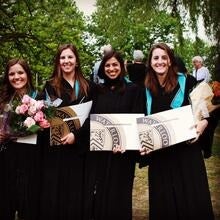
King has hired students from many different programs to assist her team with this project, including Health Informatics, Life Sciences, Biology and Science and Business students.
The students UHN hires to assist with this project will take on one of two potential roles: at-the-elbow support or non-medical device testers.
As an ‘elbow’ support, co-op students will assist clinicians directly in dealing with any issues that arise during daily clinical work once the system goes live.
As a non-medical device tester, co-op students will be responsible for ensuring the devices will function as expected with the new system and helping with getting them ready for launch.
King has been a part of five Epic implementation projects and in each project, students were brought into assist. For each project, the co-op students played a very important role.
Link of the day
When and Where to get support
Students can visit the Student Success Office online for supports including academic development, international student resources, immigration consulting, leadership development, exchange and study abroad, and opportunities to get involved.
Instructors looking for targeted support for developing online components for blended learning courses, transitioning remote to fully online courses, revising current online courses, and more please visit Agile Development | Centre for Extended Learning | University of Waterloo (uwaterloo.ca).
Instructors can visit the Keep Learning website to get support on adapting their teaching and learning plans for an online environment.
Course templates are available within your course in LEARN to help you build and edit your content and assignment pages quickly.
The following workshops, webinars, and events are offered by the KL team (CTE, CEL, ITMS, LIB):
- Independent Remote Course Design Essentials, self-directed, continuous self-enrollment course in LEARN.
- Independent Blended Course Design (iBlend), self-directed, ongoing
- Copyright Overview for Waterloo Instructors and Staff - self-directed, continuous self-enrollment course in LEARN.
- University of Waterloo Teaching and Learning Conference - April 27 and April 28.
Supports are available for employees returning to campus. Visit IST’s Hybrid Work and Technology guidelines and workplace protocols to assist with the transition.
The Writing and Communication Centre has virtual services and programs to help undergrads, grad students, postdocs and faculty members with academic writing.
- Meet with writing advisors in one-to-one appointments to brainstorm, draft, revise, and polish. No time for an appointment? Try email tutoring for undergrads.
- Beat isolation and make writing progress at weekly Virtual Writing Cafés for grad students and faculty or PJ-Friendly Writing Groups for Undergrads.
- Take an online workshop or apply to our popular Dissertation Boot Camp program.
- Faculty can request custom in-class workshops for their courses, or the WCC can facilitate any existing workshops for student groups.
- Course-integrated support available. Attention faculty and instructors: The application form for Writing and Communication Centre course-integrated support is now available online. We offer five unique support streams for your courses including synchronous and asynchronous workshops and monitored discussion boards.
Co-op students can get help finding a job and find supports to successfully work remotely, develop new skills, access wellness and career information, and contact a co-op or career advisor.
The Centre for Career Action (CCA) has services and programs to support undergrads, grad students, postdocs, alumni, and employees in figuring out what they value, what they’re good at, and how to access meaningful work, co-op, volunteer, or graduate/professional school opportunities. Questions about CCA's services? Live chat, call 519-888-4047, or stop by our front desk in the Tatham Centre 8:30 a.m. to 4:30 p.m., Monday to Friday.
Drop-in to Warrior Virtual Study Halls on Wednesdays from 5:30 p.m. to 7:00 p.m. Come together in this virtual space to set goals and work independently or in groups each week.
Renison's English Language Institute continues to offer virtual events and workshops to help students practice their English language skills.
If you feel overwhelmed or anxious and need to talk to somebody, please contact the University’s Campus Wellness services, either Health Services or Counselling Services. You can also contact the University's Centre for Mental Health Research and Treatment. Good2Talk is a post-secondary student helpline available to all students.
The Library is open with expanded hours for access to book stacks, drop-in individual study space, bookable group study rooms, drop-in access to computers and printers, book pick-up services and IST Help Desk support. Librarian consultations, Special Collections & Archives and the Geospatial Centre are available by appointment. Full details on current services and hours are available on the Library’s COVID-19 Update webpage.
The Faculty Association of the University of Waterloo (FAUW) continues to advocate for its members. Check out the FAUW blog for more information.
The University of Waterloo Staff Association (UWSA) continues to advocate for its members. Check out the UWSA blog for more information.
The Sexual Violence Prevention and Response Office (SVPRO) supports all members of the University of Waterloo campus community who have experienced, or been impacted, by sexual violence. This includes all students, staff, faculty and visitors on the main campus, the satellite campuses, and at the affiliated and federated Waterloo Institutes and Colleges. For support, email: svpro@uwaterloo.ca or visit the SVPRO website.
The Office of Indigenous Relations is a central hub that provides guidance, support, and resources to all Indigenous and non-Indigenous campus community members and oversees the University's Indigenization strategy.
The Waterloo Indigenous Student Centre, based at St. Paul’s University College, provides support and resources for Indigenous students, and educational outreach programs for the broader community, including lectures, and events.
WUSA supports for students:
Peer support - MATES, Glow Centre, RAISE, Women’s Centre - Visit https://wusa.ca/peersupport to book an appointment either in person or online for the Fall term.
Food Support Service food hampers are currently available from the Turnkey Desk 24/7 in the Student Life Centre. Drop off locations are also open again in SLC, DC, DP, SCH and all residences.
Co-op Connection all available online. Check https://wusa.ca for more details.
Centre for Academic Policy Support - CAPS is here to assist Waterloo undergraduates throughout their experience in navigating academic policy in the instances of filing petitions, grievances and appeals. Please contact them at caps@wusa.ca. More information is available.
WUSA Student Legal Protection Program - Seeking legal counsel can be intimidating, especially if it’s your first time facing a legal issue. The legal assistance helpline provides quick access to legal advice in any area of law, including criminal. Just call 1-833-202-4571.
Empower Me is a confidential mental health and wellness service that connects students with qualified counsellors 24/7. They can be reached at 1-833-628-5589.
GSA-UW supports for graduate students:
The Graduate Student Association (GSA-UW) supports students’ academic and social experience and promotes their well-being.
Advising and Support - The GSA advises graduate students experiencing challenges and can help with navigating university policies & filing a grievance, appeal, or petition.
Mental Health covered by the Health Plan - The GSA Health Plan now has an 80 per cent coverage rate (up to $800/year) for Mental Health Practitioners. Your plan includes coverage for psychologists, registered social workers, psychotherapists, and clinical counselors.
Dental Care - The GSA Dental Plan covers 60 to 70 per cent of your dental costs and by visiting dental professionals who are members of the Studentcare Networks, you can receive an additional 20 to 30 per cent coverage.
Student Legal Protection Program - Your GSA fees give you access to unlimited legal advice, accessible via a toll-free helpline: +1-833-202-4571. This advice covers topics including housing disputes, employment disputes, and disputes with an academic institution.
The Graduate House: Open Monday to Friday 11:30 a.m. to 6:00 p.m. We’re open to all students, faculty, staff, and community members. The Graduate House is a community space run by the GSA-UW. Vaccination Records and Government ID continue to be required for all dine-in guests. Graduate students who paid their fees can get discounts and free coffee.
When and Where (but mostly when)
Warriors vs. Laurier Blood Donation Battle. Join our “Waterloo Warriors” team on the Blood.ca website or app. #ItsInYouToGive
Information webinar for Waterloo researchers, “Advancing equity and inclusion in contract research and commercialization at the University of Waterloo,” Thursday, April 28, 12:15 p.m. to 12:45 p.m., online via Zoom. Please register to attend.
Master of Taxation, Virtual Information Sessions, full time info session Monday, May 2, 3:00 p.m., part-time info session, Monday, May 2, 4:00 p.m.
NEW - Armchair Chat with The Right Honourable David Johnston, Monday, May 9, 1:00 p.m. to 2:00 p.m. (armchair chat), 2:00 p.m. to 2:30 p.m. (book signing), School of Optometry and Vision Science, Room 1129.